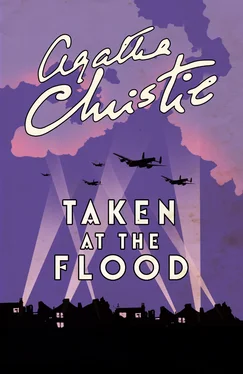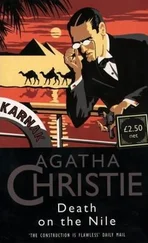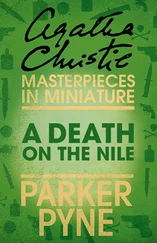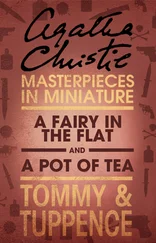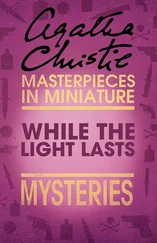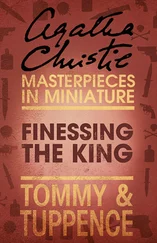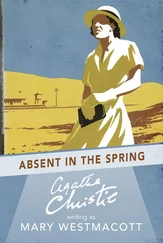

Published by HarperCollins Publishers Ltd
1 London Bridge Street
London SE1 9GF
www.harpercollins.co.uk
First published in Great Britain by
Collins 1948
Agatha Christie® Poirot® Taken at the Flood™
Copyright © 1948 Agatha Christie Limited. All rights reserved.
www.agathachristie.com
Cover design © HarperCollins Publishers Ltd 2015
Title lettering by Ghost Design
Cover photograph © Trevor Payne/Trevillion Images
Agatha Christie asserts the moral right to be identified as the author of this work.
A catalogue copy of this book is available from the British Library.
This novel is entirely a work of fiction. The names, characters and incidents portrayed in it are the work of the author’s imagination. Any resemblance to actual persons, living or dead, events or localities is entirely coincidental.
All rights reserved under International and Pan-American Copyright Conventions. By payment of the required fees, you have been granted the non-exclusive, non-transferable right to access and read the text of this e-book on screen. No part of this text may be reproduced, transmitted, down-loaded, decompiled, reverse engineered, or stored in or introduced into any information storage and retrieval system, in any form or by any means, whether electronic or mechanical, now known or hereinafter invented, without the express written permission of HarperCollins.
Source ISBN: 9780008129545
Ebook Edition © September 2015 ISBN: 9780007422838
Version: 2017-04-12
There is a tide in the affairs of men,
Which, taken at the flood, leads on to fortune;
Omitted, all the voyage of their life
Is bound in shallows and in miseries.
On such a full sea are we now afloat,
And we must take the current when it serves,
Or lose our ventures.
Contents
Cover
Title Page
Copyright
Epigraph
PROLOGUE
BOOK I
CHAPTER 1
CHAPTER 2
CHAPTER 3
CHAPTER 4
CHAPTER 5
CHAPTER 6
CHAPTER 7
CHAPTER 8
CHAPTER 9
CHAPTER 10
CHAPTER 11
CHAPTER 12
CHAPTER 13
CHAPTER 14
CHAPTER 15
CHAPTER 16
CHAPTER 17
BOOK II
CHAPTER 1
CHAPTER 2
CHAPTER 3
CHAPTER 4
CHAPTER 5
CHAPTER 6
CHAPTER 7
CHAPTER 8
CHAPTER 9
CHAPTER 10
CHAPTER 11
CHAPTER 12
CHAPTER 13
CHAPTER 14
CHAPTER 15
CHAPTER 16
CHAPTER 17
Also by Agatha Christie
About the Publisher
In every club there is a club bore. The Coronation Club was no exception; and the fact that an air raid was in progress made no difference to normal procedure.
Major Porter, late Indian Army, rustled his newspaper and cleared his throat. Every one avoided his eye, but it was no use.
‘I see they’ve got the announcement of Gordon Cloade’s death in the Times ,’ he said. ‘Discreetly put, of course. On Oct. 5th, result of enemy action . No address given. As a matter of fact it was just round the corner from my little place. One of those big houses on top of Campden Hill. I can tell you it shook me up a bit. I’m a Warden, you know. Cloade had only just got back from the States. He’d been over on that Government Purchase business. Got married while he was over there. A young widow—young enough to be his daughter. Mrs Underhay. As a matter of fact I knew her first husband out in Nigeria.’
Major Porter paused. Nobody displayed any interest or asked him to continue. Newspapers were held up sedulously in front of faces, but it took more than that to discourage Major Porter. He always had long histories to relate, mostly about people whom nobody knew.
‘Interesting,’ said Major Porter, firmly, his eyes fixed absently on a pair of extremely pointed patent-leather shoes—a type of footwear of which he profoundly disapproved. ‘As I said, I’m a Warden. Funny business this blast. Never know what it’s going to do. Blew the basement in and ripped off the roof. First floor practically wasn’t touched. Six people in the house. Three servants: married couple and a housemaid, Gordon Cloade, his wife and the wife’s brother. They were all down in the basement except the wife’s brother—ex-Commando fellow—he preferred his own comfortable bedroom on the first floor—and by Jove, he escaped with a few bruises. The three servants were all killed by blast—Gordon Cloade was buried, they dug him out but he died on the way to hospital. His wife was suffering from blast, hadn’t got a stitch of clothing on her! but she was alive. They think she’ll pull through. She’ll be a rich widow—Gordon Cloade must have been worth well over a million.’
Again Major Porter paused. His eyes had travelled up from the patent-leather shoes—striped trousers—black coat—egg-shaped head and colossal moustaches. Foreign, of course! That explained the shoes. ‘Really,’ thought Major Porter, ‘what’s the club coming to? Can’t get away from foreigners even here .’ This separate train of thought ran alongside his narrative.
The fact that the foreigner in question appeared to be giving him full attention did not abate Major Porter’s prejudice in the slightest.
‘She can’t be more than about twenty-five,’ he went on. ‘And a widow for the second time. Or at any rate—that’s what she thinks…’
He paused, hoping for curiosity—for comment. Not getting it, he nevertheless went doggedly on:
‘Matter of fact I’ve got my own ideas about that. Queer business. As I told you, I knew her first husband, Underhay. Nice fellow—district commissioner in Nigeria at one time. Absolutely dead keen on his job—first-class chap. He married this girl in Cape Town. She was out there with some touring company. Very down on her luck, and pretty and helpless and all that. Listened to poor old Underhay raving about his district and the great wide-open spaces—and breathed out, “Wasn’t it wonderful?” and how she wanted “to get away from everything.” Well, she married him and got away from it. He was very much in love, poor fellow—but the thing didn’t tick over from the first. She hated the bush and was terrified of the natives and was bored to death. Her idea of life was to go round to the local and meet the theatrical crowd and talk shop. Solitude à deux in the jungle wasn’t at all her cup of tea. Mind you, I never met her myself—I heard all this from poor old Underhay. It hit him pretty hard. He did the decent thing, sent her home and agreed to give her a divorce. It was just after that I met him. He was all on edge and in the mood when a man’s got to talk. He was a funny old-fashioned kind of chap in some ways—an R.C., and he didn’t care for divorce. He said to me, “There are other ways of giving a woman her freedom.” “Now, look here, old boy,” I said, “don’t go doing anything foolish. No woman in the world is worth putting a bullet through your head.”
‘He said that that wasn’t his idea at all. “But I’m a lonely man,” he said. “Got no relations to bother about me. If a report of my death gets back that will make Rosaleen a widow, which is what she wants.” “And what about you?” I said. “Well,” he said, “maybe a Mr Enoch Arden will turn up somewhere a thousand miles or so away and start life anew.” “Might be awkward for her some day,” I warned him. “Oh, no,” he says, “I’d play the game. Robert Underhay would be dead all right.”
Читать дальше
